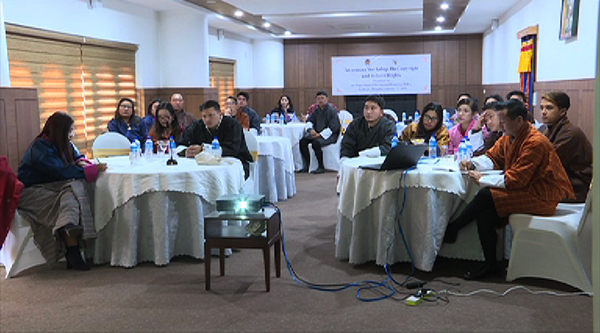 In an effort to give stronger protection to the creators over their creations in the new market place amidst the rise and advancement of digital technology which has broadened the scope of copyright as well as challenges, the department of intellectual property brought together relevant stakeholders to discuss challenges, issues and way forward.
In an effort to give stronger protection to the creators over their creations in the new market place amidst the rise and advancement of digital technology which has broadened the scope of copyright as well as challenges, the department of intellectual property brought together relevant stakeholders to discuss challenges, issues and way forward.
The participants during the workshop said, while the level of awareness on copyright and related rights is gradually increasing, there are areas where the department needs to speed up its awareness efforts.
“I feel it’s very important. As artist copyright means that we have to protect our individual self and basically when we channel, I guess what I do through music is expressing my individual self. So it’s like protecting your individuality. Like my two peers from M-Studio said that they were broadcasting songs without permissions. So I guess it’s a huge infringement that has been ignored. So if that can be taken cared of then I think it would be very helpful for both of us as well as who are aspiring to become musicians and artists,” said Kinley Wangchuk, a participant from M-Studio.
“Till date Royal Academy of Performing Arts (RAPA) hasn’t been making use of Intellectual Property and copyrights in protecting our songs and other various cultural components. Nonetheless, I feel that our wealth is our culture. And if we do not preserve it, in a few years time, it will disappear. So that’s why I feel that it’s time that we need to take intellectual property further and use it to our best,” added Nim Gyeltshen, a Mask dance Instructor at RAPA.
Music, paintings and architectural drawings and literary compositions can be copied by someone without the consent or knowledge of the original composer. It is illegal as per the copyright act. Copyright gives protection to literary works, films, musical compositions, artistic works such as paintings, drawings, photographs, architecture and sculpture.
“Intellectual Property as a whole is very crucial in creating a conducive environment for the growth of innovation and creativity in the country and also to stimulate their creativity and innovation. When there is intellectual property, it grants or rewards the people who are involved in creating or innovating with rights. So with that right, they can control and benefit out of their creations or innovations. So basically they can make money out of their works by exercising their rights. When they can make money, it serves as an incentive for them to dedicate their time or efforts in creating more and innovating more,” said Kuenga Dorji, an Intellectual Property Officer at the Dept of Intellectual Property under the Ministry of Economic Affairs.
To further enhance the awareness of copyright and related rights, the department is revising the copyright act 2001, agreeing to relevant treaties and looking at effective enforcement of rights by creating robust awareness programmes.
Sonam Pem








